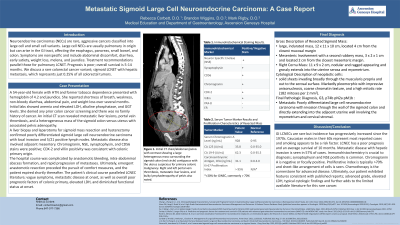Sunday Poster Session
Category: Colon
P0361 - Metastatic Sigmoid Large Cell Neuroendocrine Carcinoma: A Case Report
Sunday, October 27, 2024
3:30 PM - 7:00 PM ET
Location: Exhibit Hall E

Has Audio
.jpg)
Rebecca Corbett, DO, MS
Ascension Genesys
grand blanc, MI
Presenting Author(s)
Rebecca Corbett, DO, MS1, Mark Rigby, DO1, Brandon T. Wiggins, DO, MPH2
1Ascension Genesys, Grand Blanc, MI; 2Ascension Genesys Hospital, Grand Blanc, MI
Introduction: Neuroendocrine carcinomas (NECs) are rare, aggressive cancers classified into large cell and small cell variants. Large cell NECs are usually pulmonary in origin but can arise in the GI tract, affecting the esophagus, pancreas, small bowel, and colon. Symptoms are nonspecific and include abdominal discomfort, diarrhea, early satiety, weight loss, melena, and jaundice. Treatment recommendations parallel those for pulmonary LCNET. Prognosis is poor; overall survival is 5-14 months.We discuss a rare colorectal cancer variant; sigmoid LCNET with hepatic metastasis, which represents just 0.25% of all colorectal tumors.
Case Description/Methods: A 54-year-old female with HTN and former tobacco dependence presented with hemoglobin of 4.2 and jaundice. She reported shortness of breath, weakness, non-bloody diarrhea, abdominal pain, and weight loss. Initial labs showed anemia and elevated LDH, alkaline phosphatase, and GGT. She denied prior colon cancer screening. A CT scan revealed metastatic liver lesions, portal vein thrombosis, and a heterogeneous mass of the sigmoid colon versus uterus with pelvic adenopathy. A liver biopsy and laparotomy for sigmoid mass resection and hysterectomy confirmed poorly differentiated sigmoid large cell neuroendocrine tumor with local invasion and 5/21 positive lymph nodes. Chromogranin, NSE, synaptophysin, and CD56 were positive. The hospital course was complicated by anastomotic bleeding, intra-abdominal abscess, and progression of metastases. Emergent anastomotic resection preceded the pursuit of comfort measures, and the patient expired shortly thereafter. The clinical course paralleled LCNEC literature; vague symptoms, metastatic disease, and poor prognostic factors of colonic primary, elevated LDH, and functional status.
Discussion: GI LCNECs are rare but incidence has progressively increased since the1970s. Caucasian males in their 60s represent most reported cases and smoking appears to be a risk factor. LCNEC has a poor prognosis and an average survival of 10 months. Metastatic disease with hepatic invasion is seen in 57% of cases. Immunohistochemistry is crucial to diagnosis; synaptophysin and NSE positivity is common. Chromogranin A is negative or focally positive. Proliferative index is typically >70% and sheet-like arrangement of cells is seen. Chemotherapy is the cornerstone for advanced disease. Our patient exhibited features consistent with published reports;advanced grade, elevated LDH, cytologic findings and further adds to available literature.
Disclosures:
Rebecca Corbett, DO, MS1, Mark Rigby, DO1, Brandon T. Wiggins, DO, MPH2. P0361 - Metastatic Sigmoid Large Cell Neuroendocrine Carcinoma: A Case Report, ACG 2024 Annual Scientific Meeting Abstracts. Philadelphia, PA: American College of Gastroenterology.
1Ascension Genesys, Grand Blanc, MI; 2Ascension Genesys Hospital, Grand Blanc, MI
Introduction: Neuroendocrine carcinomas (NECs) are rare, aggressive cancers classified into large cell and small cell variants. Large cell NECs are usually pulmonary in origin but can arise in the GI tract, affecting the esophagus, pancreas, small bowel, and colon. Symptoms are nonspecific and include abdominal discomfort, diarrhea, early satiety, weight loss, melena, and jaundice. Treatment recommendations parallel those for pulmonary LCNET. Prognosis is poor; overall survival is 5-14 months.We discuss a rare colorectal cancer variant; sigmoid LCNET with hepatic metastasis, which represents just 0.25% of all colorectal tumors.
Case Description/Methods: A 54-year-old female with HTN and former tobacco dependence presented with hemoglobin of 4.2 and jaundice. She reported shortness of breath, weakness, non-bloody diarrhea, abdominal pain, and weight loss. Initial labs showed anemia and elevated LDH, alkaline phosphatase, and GGT. She denied prior colon cancer screening. A CT scan revealed metastatic liver lesions, portal vein thrombosis, and a heterogeneous mass of the sigmoid colon versus uterus with pelvic adenopathy. A liver biopsy and laparotomy for sigmoid mass resection and hysterectomy confirmed poorly differentiated sigmoid large cell neuroendocrine tumor with local invasion and 5/21 positive lymph nodes. Chromogranin, NSE, synaptophysin, and CD56 were positive. The hospital course was complicated by anastomotic bleeding, intra-abdominal abscess, and progression of metastases. Emergent anastomotic resection preceded the pursuit of comfort measures, and the patient expired shortly thereafter. The clinical course paralleled LCNEC literature; vague symptoms, metastatic disease, and poor prognostic factors of colonic primary, elevated LDH, and functional status.
Discussion: GI LCNECs are rare but incidence has progressively increased since the1970s. Caucasian males in their 60s represent most reported cases and smoking appears to be a risk factor. LCNEC has a poor prognosis and an average survival of 10 months. Metastatic disease with hepatic invasion is seen in 57% of cases. Immunohistochemistry is crucial to diagnosis; synaptophysin and NSE positivity is common. Chromogranin A is negative or focally positive. Proliferative index is typically >70% and sheet-like arrangement of cells is seen. Chemotherapy is the cornerstone for advanced disease. Our patient exhibited features consistent with published reports;advanced grade, elevated LDH, cytologic findings and further adds to available literature.
Disclosures:
Rebecca Corbett indicated no relevant financial relationships.
Mark Rigby indicated no relevant financial relationships.
Brandon Wiggins indicated no relevant financial relationships.
Rebecca Corbett, DO, MS1, Mark Rigby, DO1, Brandon T. Wiggins, DO, MPH2. P0361 - Metastatic Sigmoid Large Cell Neuroendocrine Carcinoma: A Case Report, ACG 2024 Annual Scientific Meeting Abstracts. Philadelphia, PA: American College of Gastroenterology.
